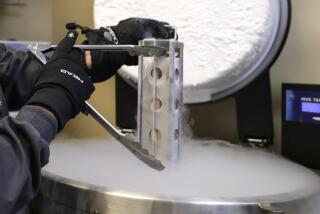Tumor Victim Loses Bid to Freeze Head Before Death : Cryonics: Judge says request is a ‘giant step’ beyond rulings allowing terminally ill patients to refuse medical treatment.
- Share via
SANTA BARBARA — A Superior Court judge on Friday rejected the petition of a computer consultant with an inoperable brain tumor who sued the state for the right to have his head frozen before he dies in the hope that scientists will discover a way to remove the tumor and attach the head to a healthy body.
The suit, the first of its kind in the county, could have broad implications in the issue of a terminally ill person’s right to choose how and when he dies.
Thomas Donaldson, 46, is a longtime proponent of cryonics, the controversial practice of freezing people after they have died in the hope that someday they can be revived. While there is nothing illegal about that practice, Donaldson wants to take it a step further and be chemically frozen while he is alive.
If he waits until he dies a natural death, the tumor will have destroyed his brain to such an extent that “there would be no point in being revived,” he said.
“Under the current, stupid criteria, my brain could be entirely destroyed before I’m declared legally dead,” Donaldson said Friday. “That’s why I filed the lawsuit.”
But Superior Court Judge Ronald Stevens said that while the courts have allowed terminally ill patients to refuse medical treatment, it would be a “giant step” to allow cryonic technicians to freeze Donaldson before he is legally dead.
Under current law, those assisting Donaldson could be prosecuted for murder or assisting a suicide.
Assistant Atty. Gen. Kristofer Jorstad, who represented the state, said Donaldson can “put a bullet into his own heart. . . . But he can’t have people associated with cryonics put that bullet into his heart. That’s murder one.”
Donaldson has 30 days to amend the lawsuit and resubmit the petition to the judge. If he is unsuccessful, he plans to appeal the case.
“If the case goes all the way to the Supreme Court and they turn me down, I’ll just starve myself to death,” he said. “Then I can be frozen before my brain goes and no one can be prosecuted.”
Donaldson’s attorney, Christopher Ashworth, said his client has a constitutional right--”the right of privacy”--to end his life when he chooses.
“There’s no reason Thomas Donaldson should have to die screaming in his pillow,” Ashworth said after the hearing. “He shouldn’t have to endure the pain and degradation of waiting until the tumor slowly destroys him.”
Donaldson is seeking to prevent local and state authorities from interfering with his cryonic suspension. He wants to prevent those involved with the procedure from being prosecuted. And he wants to ensure that the county coroner does not perform an autopsy, which would make him “unsuitable for effective preservation,” he said.
While most scientists are skeptical of cryonics, Donaldson believes that eventually there will be technology to bring him back to life and safely remove his brain tumor. And because only his head will be preserved, he is counting on future scientists to use his cells to create another body.
The head would be surgically removed and bequeathed to the Alcor Life Extension Foundation, a nonprofit cryonic organization with a facility in a Riverside industrial park.
Under the procedure, Donaldson would be anesthetized and placed on a heart-lung machine while he is still alive. Then the cooling process would begin as technicians injected a chemical solution to replace his blood. The chemicals prevent formation of ice crystals, he said, and minimize damage caused by freezing.
After Donaldson’s head is removed, it would be placed in a device that looks like a “giant stainless steel Thermos,” said Alcor President Carlos Mondragon. Liquid nitrogen would keep the head at a temperature of 320 degrees Fahrenheit below zero.
“We actually take a more conservative position than most people who just want to incinerate a body or feed it to the insects,” Mondragon said. “We’re saying instead, we’ll put you into the best holding pattern that we can currently devise, and then wait for technology to catch up.”
Donaldson said he is not the sort of “flake” some people associate with cryonics. He has a doctorate in mathematics from the University of Chicago and has held high-powered computer jobs with Silicon Valley firms. But he became intrigued with cryonics during the 1970s when he learned of scientific experiments in which human organs were frozen, he said, and then functioned for a short time after being thawed.
“As I see it, this is the only alternative to death,” said Donaldson, of Sunnyvale. “I know we don’t have all the technology right now, but I think it’s entirely possible in the future.”
And to ensure that he has some company in an era when all his contemporaries will be dead, his wife has signed up for the program too.
In 1975, Donaldson made the financial arrangements for cryonic suspension by naming a cryonic firm as the beneficiary of his life insurance policy. Thirteen years later he was diagnosed as having an inoperable brain tumor.
Almost 200 people have made the financial arrangements with Alcor for cryonic suspension and 16 are frozen, Mondragon said. The minimum cost is $35,000 for the preservation of a head and $100,000 for a full-body suspension.






